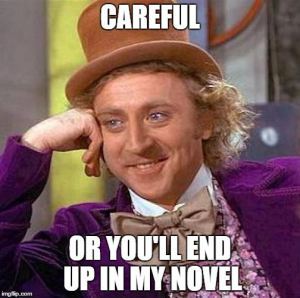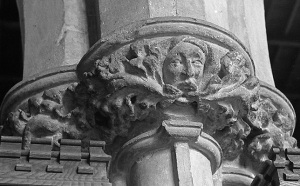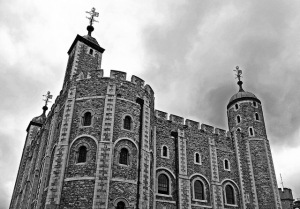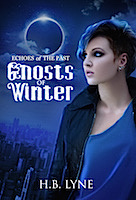H.B. Lyne's Blog, page 3
June 29, 2015
My Top 5 Ted Talks of All Time
Inspired by Vicky over at Single Mother Ahoy! I decided to list my top five favourite Ted Talks. I absolutely love Ted, the whole idea is amazing. People come together in venues all around the world to give inspirational talks on all manner of subjects. It was hard to narrow it down to just five, but here goes.
5. Hackschooling Makes Me Happy – Logan LaPlante. Learn from a teenager how unschooling works and why his home education is focused on what really matters.
4. The Art of Asking – Amanda Palmer. A wonderful and inspirational talk from one of the most successful crowdfunders ever. Palmer describes her experiences of interacting with her fans.
3. Why we should give everyone a basic income – Rutger Bergman. I’ve been an advocate of universal basic income for a few years now and whenever I get into a discussion online about it I direct people to this video. It’s a simple explanation of the idea and why it would work.
2. The Power of Introverts – Susan Cain. Our society tends to value the traits of extroverts far above those of us introverts. Cain explains why we shouldn’t try to change introverts and how we can contribute to society.
And finally, my absolute favourite Ted talk of all time…
1. Changing Education Paradigms – Sir Ken Robinson. All of Ken Robinson’s Ted talks are brilliant, but this one, with the RSA animation, is my favourite. It’s my go-to video whenever I have a wobble about my children’s education.
I hope you enjoy these talks! Let me know your favourites in the comments below. I’m always keen to broaden my horizons so would love suggestions of what to watch next!
Filed under: Lifestyle, Personal, Sociology/Politics, Technology Tagged: Amanda Palmer, Art of Asking, basic income, crowdfunding, education, free money, hackschooling, home education, introverts, Ken Robinson, Logan LaPlante, Rutger Bergman, Susan Cain, Ted talks, Tedx, unschooling








June 27, 2015
People Power in the Digital Age
The publishing industry is changing faster than ever before. Previous upheavals include things like…. paperbacks (gasp!), and online retailers (oh no!). Each revolutionary idea was heralded as the death of quality literature or the end of book shops. The cynics were wrong.
 Some people have seen the tide turning and flowed with it, changing their business to keep up. So some book shops have survived, they’ve adapted to the digital age and are offering their customers something more, an experience. Many have seen that the future lies in the digital and have adapted their business model to accommodate that, such as Barnes & Noble putting out their own e-reader device, the Nook. The small independent book shop has been a dying breed for a long time now, which is a great loss, I grant you. But people are still reading.
Some people have seen the tide turning and flowed with it, changing their business to keep up. So some book shops have survived, they’ve adapted to the digital age and are offering their customers something more, an experience. Many have seen that the future lies in the digital and have adapted their business model to accommodate that, such as Barnes & Noble putting out their own e-reader device, the Nook. The small independent book shop has been a dying breed for a long time now, which is a great loss, I grant you. But people are still reading.
The digital age spawned the single biggest change to the industry: self-publishing. People have been self-publishing for decades, but it used to be a costly business, with authors having to pay out a small fortune for thousands of prints of their book, which will have largely ended up sitting in boxes in their garage or loft. What most people never realise is that the vast majority of traditionally published books only ever sell a handful of copies. So ambitious authors would print themselves scores of books (often because they had no choice, as printers would only accept print runs far in excess of the number of books the author could ever hope to sell) and end up pulping them, just like the big publishers do.
Self-publishing had a bad reputation for a long time, it still does in some corners of society. The big publishers were seen as the gate-keepers, the guardians who were there to protect the public from “bad” writing. A book couldn’t physically be purchased from a book store without it going through the vigorous machine that was supposedly there to weed out the slush. A writer first had to find an agent willing to represent them, then a publisher, who would assign an editor and trusted cover designer. The marketing department would do their thing to get the books into shops and onto billboards. Then the royalties would come flowing in. Right?
Wrong. The big publishers never really cared about quality writing, they cared about selling books. That didn’t always mean the best quality writing, let’s be honest. We’ve all read a bad book that was traditionally published. We’ve all spotted typos in store-bought books. The big publishers have never been infallible.
In the face of the digital revolution, some of the major publishing houses have panicked, and ended up picking up utter trash to put out, because they know it will prove popular (mentioning no names, nor colours or shades). A book doesn’t always have to be well written to capture an audience and the old school publishers know that. Yet they have thrived on the reputation of being the ones to impress, the ones to protect the public and introduce them only to the very best writing.
 It has always been the case that some excellent books never sell well, while some terrible ones do. It’s always been part luck, part vigorous marketing as to whether a book succeeds or not. A few years ago, even getting picked up by a publisher didn’t mean much for most writers. Even IF their book made it to launch and got into book shops, chances are their book would be one of thousands of spines on the shelves, not placed on a table in the doorway, or even face out on the shelf. Most writers with a traditional publishing contract could not reasonably expect their books to sell. Most would go to pulp and the writer’s contract terminated. Such was the life of the author.
It has always been the case that some excellent books never sell well, while some terrible ones do. It’s always been part luck, part vigorous marketing as to whether a book succeeds or not. A few years ago, even getting picked up by a publisher didn’t mean much for most writers. Even IF their book made it to launch and got into book shops, chances are their book would be one of thousands of spines on the shelves, not placed on a table in the doorway, or even face out on the shelf. Most writers with a traditional publishing contract could not reasonably expect their books to sell. Most would go to pulp and the writer’s contract terminated. Such was the life of the author.
So if quality never really mattered, why place so much respect at the traditional publisher’s door? Why assume that a self-publishing author isn’t able to do a better job?
I knew I would self-publish Echoes of the Past because I just wanted to share the story with people. I knew it was a powerful one that could move people and I didn’t want to spend years knocking on the doors of agents and publishers only to potentially end up not having a single other person share that story with me. I knew I needed to put it out there myself. It still might not sell many copies, but at least it would be out there for anyone to read if they want to.
Digital publishing means that self-publishing no longer requires massive outlays on boxes of books, now we can reach people relatively quickly and cheaply; it actually costs nothing to get an ebook onto Amazon. However, if an author wants to sell any books at all, and wants to be well-received, they had better make sure their book looks as good as possible. With no publisher to cover the costs, we have to hire our own editor and cover designer. Unless a writer also happens to be a whiz with image software, then outsourcing the cover design is essential. Because readers really do judge a book by its cover, and now all the covers will be seen, perhaps only as thumbnails, but they will be displayed on all of the websites that sell the book. Readers aren’t just seeing the spine when they browse.
I’ve come across writers who insist that they don’t need an editor, and even one who was scornful of any writer who did hire an editor! But I’m a realist, I know that editing is a very different skill to writing and accept that I am too close to my own words to see them honestly. The editor I work with assures me that my writing is very clean and that working on my books is an enjoyable experience, but that doesn’t mean that I don’t benefit greatly from her input. She notices if I overuse a phrase and can suggest alternatives; she spots any inconsistencies and typos that I missed during revisions; and so on. For any fellow writers reading this, I highly recommend Zoe Markham, by the way, she is a genuine pleasure to work with.
Then there are the other costs of running a business, which is what self-publishing is. Writing is more than a hobby to me, I am an author, this is my vocation. So I have a website to maintain, server costs, administration, marketing, and so on. It all adds up.
As I said, I desperately want to share Echoes of the Past with people. I want others to read the series, I want the books to be seen and devoured. That won’t happen if I don’t make the books as good as possible. It starts with my writing, of course, but it requires input from other professionals, whom I have to pay. I scraped the money together for the first two books in the series, but my circumstances have changed and mean that I’m no longer in a position to do that with the third book. So a few months ago I began to look seriously at crowdfunding.
I’ve contributed to several crowdfunding campaigns in recent years and really love the whole idea. So it seemed a natural step for me to run my own. For those new to the idea, there are various platforms, the most famous being Kickstarter and IndieGoGo. People with an idea who need to raise funds can do so on one of these platforms. They offer incentives/perks/rewards for contributors, who then pledge to support the idea. Usually, contributors only pay out if a target is met, though this does vary from one campaign to another.
It seems to me that people are very keen on taking power back right now. People want to share their ideas and can’t or don’t want to rely on old institutions, like publishers or banks, to help finance their ideas. Crowdfunding is a natural accompaniment to self-publishing. We’ve taken back our power from the big publishers, and now we’re freeing ourselves from the tight controls of traditional investors. People power has achieved some amazing things, and I believe that it can do the same for literature.
 I chose to run my campaign with Pubslush, a platform dedicated to funding independent authors. Their name comes from the idea of the slush pile, the rejected manuscripts that should have made it to print. Money shouldn’t be a barrier to new authors getting started, a great idea should be shared. One of the great aspects of choosing Pubslush, aside from the expert support that they can provide, is their wonderful non-profit wing. The Pubslush Foundation works tirelessly around the globe funding literacy programs for the most disadvantaged communities. Illiteracy locks people into poverty, increases likelihood of them turning to crime and shortens their lifespan. One in five people in the world are illiterate, two thirds of whom are women.
I chose to run my campaign with Pubslush, a platform dedicated to funding independent authors. Their name comes from the idea of the slush pile, the rejected manuscripts that should have made it to print. Money shouldn’t be a barrier to new authors getting started, a great idea should be shared. One of the great aspects of choosing Pubslush, aside from the expert support that they can provide, is their wonderful non-profit wing. The Pubslush Foundation works tirelessly around the globe funding literacy programs for the most disadvantaged communities. Illiteracy locks people into poverty, increases likelihood of them turning to crime and shortens their lifespan. One in five people in the world are illiterate, two thirds of whom are women.
Equality is something I am passionate about and most of my political and community activity is based on tackling that. So I’m donating 5% of the total I raise through crowdfunding to the Pubslush Foundation. My campaign launches on 1st July, so save the date and come check it out here: http://tidesofspring.pubslush.com/
I mentioned small book shops at the start of this article, well, to round off I wanted to mention two local book shops who both turned to their supporters on the internet to save their businesses. Bradford comic book shop, It’s A Trap, and Saltaire Bookshop were both bolstered by their supporters when in need. The digital age doesn’t have to spell the end of independent retailers, it can and should be a tool to aid them. So do please go out and support them with your custom, as well as supporting hard working independent authors. Thank you.
Filed under: Book News, Publishing, Technology Tagged: Amazon, Barnes & Noble, book shop, crowdfunding, ebook, Echoes of the Past, ereader, illiteracy, indie author, indiegogo, It's a Trap, kickstarter, Kindle, literacy, Nook, poverty, publishing, pubslush, Saltaire Bookshop, self-publishing








June 24, 2015
Wordless Wednesday 24th June

Image courtesy of “Thor” @ Creative Commons on Flickr
Filed under: Wordless Wednesday Tagged: acrobatics, athletics, freerunning, parkour, photography, Wordless Wednesday








June 21, 2015
Sticks and Stones
 Remember that old rhyme that your parents used to recite every time you fell out with someone as a kid? Ah, if only it were true.
Remember that old rhyme that your parents used to recite every time you fell out with someone as a kid? Ah, if only it were true.
Sticks and stones may break my bones
But names will never hurt me
Names hurt. Harsh words sting. Cruelty is punishment.
I like to kid myself that people grow out of being bullies and that by adulthood we should be free of the cruelty of youth. However, that hasn’t been my experience. Far from being toughened up by being bullied as a child, I find myself still fairly easily hurt by the cruel words of other adults, even complete strangers. But then, I am a sensitive soul, and I wouldn’t dream of taking that away from myself. I wonder if those people were like the bullies I encountered in childhood. Have they always been that way? Or were they themselves bullied as a child and have in turn become the bully?
The internet is a strange land, full of people from all walks of life. But it does seem to be the case that while it can be a wonderful tool for communication, it can also bring out the worst in people. It’s easy to lash out at people you don’t really know well, to say things that you would never dream of saying to their face.
Meaning can get lost, especially on a medium like Twitter where characters are limited so harshly. It’s hard to get a point across succinctly sometimes. But at other times it is abundantly clear that a person’s intent is to cause upset, or at the very least, they don’t care if they do. I’ve been guilty in the past of being rather blunt on the internet, and have gotten into disagreements with people, so I’m not claiming perfection. But I like to think that I’ve grown as I’ve matured and such incidents are less and less frequent.
All communities have their sharks, I’ve found. Amongst the wonderful, friendly and supportive folks, there are usually a handful who care little for the feelings of others. The “bigger fish” in any group often seem to be very popular, surrounding themselves with devoted fans, but when you scratch the surface you find that there’s not a great deal of warmth there. They are effective salespeople, having sold their personality to a lot of people through a carefully crafted online persona, but they have a ruthless edge that is easily provoked. I’ve encountered two such people in totally different circles in the last few years and both times it has come as a rude awakening.
While vicious words hissed across the internet can be shocking, sometimes the deepest wounds are inflicted by indifference.
I had a falling out with a friend about two and a half years ago and she said the most upsetting thing that anyone has ever said to me. She told me that arguing with me was insignificant to her, I mattered so little to her that she wasn’t remotely affected by our argument. That was like a knife to the chest, as I considered her to be one of, if not my single closest friend and our argument was utterly devastating to me. While we were actual “real life” friends, the entire argument took place via text message. Would she have said such a hurtful thing to my face? Maybe. Maybe not. We haven’t spoken since.
 Thankfully such painful experiences are rare, but they do tend to stay with me for a long time. Writing helps me to process the complicated feelings that arise from upsets. A particularly cathartic exercise employed by some writers is to create characters based on the people who have hurt us and revelling in killing them off in the most satisfying way possible. It’s not something I have done myself, yet, there’s always the possibility of that changing!
Thankfully such painful experiences are rare, but they do tend to stay with me for a long time. Writing helps me to process the complicated feelings that arise from upsets. A particularly cathartic exercise employed by some writers is to create characters based on the people who have hurt us and revelling in killing them off in the most satisfying way possible. It’s not something I have done myself, yet, there’s always the possibility of that changing!
For those of a sensitive nature, like myself, I highly recommend reading The Highly Sensitive Person by Elaine N. Aron. Reading this in my late teens really helped me to appreciate my sensitivity, and when I need to I still go back to it to help me cope with some of the harsher elements of adult life.
Have you had a negative experience with someone online? How did you handle it? Are you a dweller? Or are you able to move on quickly? Let me know in the comments below, perhaps we can support one another.
For news straight to your inbox, subscribe to my mailing list today. You’ll also receive a free copy of my short story, The Storm Riders’ Vigil.
Connect with me on Facebook and Twitter.
Filed under: Lifestyle, Personal Tagged: bully, cyber bullying, highly sensitive person, online etiquette








June 17, 2015
Bringing Outside Inside – Nature’s Tendency to Make the Grey Green Again
One of the challenges I face in writing Echoes of the Past is that my principle antagonists, The Witches, are devoted to nature, as am I. They are members of a sect that believes that shifters are more a part of the natural world than the world of humanity. They view humans as a scourge to the planet, blaming them for the massive amount of environmental devastation that we see around us. My protagonists, on the other hand, fully embrace technology, electricity, urban development, and so on.
It’s a tricky place for me, as the author, to reside. I sympathise with both sides, yet my job is to convince my readers to take one side over the other. If I had to pick one ideology, I would say that my own views lie a little closer to those of The Witches than those of Stalker and her pack mates. Though I hasten to add that I would never advocate genocide in order to redress the balance between humanity and nature!
I do, however, gain some satisfaction when nature reclaims places of industry. I was recently scouting for a location to film my pitch video for my forthcoming crowdfunder campaign, which will be launching on Pubslush in a few short weeks. A friend of a friend suggested I check out this abandoned mill, so I did. It’s terrific! The interior is still largely just an empty shell, with some debris scattered throughout, but nature has begun to get to work on the exterior of the building.
Only the ground floor is accessible, without taking the risk of climbing up the outside of the building, so I don’t know what state the upper floors are in, but the tree growing out through the wall suggests that nature has found her way inside up there. I’m yearning to get up there and take a look!
Now, there is a very good reason why I would be looking for a location like this for my video, and that’s because in book three of the series, Tides of Spring, readers will get to take a peek inside one such building. Allowing nature to reclaim the land is something The Witches are very keen on, and their territory is littered with such examples. The abandoned factory that features in the book is quite thoroughly embraced by nature, with trees and grasses bursting up through the concrete to make what was grey green again. Bringing life back to dead places is one of the core principles of The Witches.

“Green Man carving”. Licensed under Public Domain via Wikimedia Commons – https://commons.wikimedia.org/wiki/File:Green_Man_carving.jpg#/media/File:Green_Man_carving.jpg
There is a mysterious European phenomenon related to bringing nature into buildings, that of the Green Man. Our architecture is inundated with these strange, goblin-like faces that no one can really explain. Many churches have them, either featured or slightly hidden, which some historians have speculated may have been an attempt to integrate traditional pagan iconography with the new Christian religion when various cultures throughout the continent converted, many centuries ago. But there is no solid evidence for this. It’s possible that the Green Man is a depiction of Lud, Cernunnos or Pan, or some other nature-based deity. We will probably never know, but his face appears throughout Europe, and even elsewhere around the world, and is associated with various myths and stories, from Puck to Peter Pan. The Green man’s association with rebirth connects him to The Witches in Echoes of the Past.
My Pinterest board for Echoes features several images of quite extreme examples of nature reclaiming man-made structures. Do click through and follow the board for more inspirational images for the series.
Don’t forget, you can subscribe to my mailing list here for all the latest news straight to your inbox.
Filed under: Book News, Mythology Tagged: abandoned buildings, Green Man, nature, overgrown building, pagan, Witches








June 10, 2015
Wordless Wednesday 10th June

Unknown Artist
Filed under: Wordless Wednesday Tagged: Fantasy Art, Norse myth, Valkyrie, Wordless Wednesday








May 13, 2015
Wordless Wednesday 13th May 2015

https://www.pinterest.com/pin/232428030745582723/
Filed under: Mythology, Wordless Wednesday Tagged: goddess, greek mythology, Plane, Wordless Wednesday








May 12, 2015
Inspired By Ravens
I’ve always been fascinated by shamanism, which is probably why it wove its way into Echoes of the Past almost without my realising. As a teenager I would meditate for hours, searching for my spirit guide and longing to traverse the astral plain. Now I’m writing a series that features a magnificent plain of pure crystal that the shape shifting protagonists can travel to, and ritual magic that is sometimes performed in trance-like states. It’s not difficult to trace the inspiration!

Image courtesy of Willow C. Winsham
Norse mythology has also been hugely inspirational and has some wonderful examples of shamanism. Odin, the Allfather, highest of the gods, is depicted as a shaman in various primary sources of Norse mythology. He undergoes a great trial and loses an eye in order to receive the knowledge of the entire universe, he then spends most of his time in a trance, observing life in the other eight realms. He has two helpers in this task, two ravens called Hunin (thought) and Munin (desire), who fly out into the world to be his eyes. The idea of spirit familiars, or a shaman projecting their consciousness into an animal is common in mythologies from around the world. It is unclear from the original texts whether Hunin and Munin are animal familiars or Odin’s own consciousness. Either way, he uses them as his messengers throughout the nine realms.
Another example of shamanism in Norse myth are the berserkers, fierce warriors thought to channel the spirits of wolves, bears and dogs on the battlefield.
Archaeologist Neil Price has this to say:
They run howling and foaming through the groups of fighting men. Some of them wear animal skins, some are naked, and some have thrown away shields and armour to rely on their consuming frenzy alone. Perhaps some of the greatest warriors do not take the field at all, but remain behind in their tents, their minds nevertheless focused on the combat. As huge animals their spirit forms wade through the battle, wreaking destruction.
– Price, Neil S. 2002. The Viking Way: Religion and War in Late Iron Age Scandinavia. p. 394. As referenced here: http://norse-mythology.org/concepts/s...
The Berserkers in Echoes of the Past are based heavily on these accounts, and are able to channel “Odin’s fire”, or ecstasy to propel them to great feats of strength and ferocity in battle, as well as rapid healing. This of course is linked to the phenomenon of adrenaline enabling humans to display apparently superhuman speed and strength.
I have connected these two elements of Norse mythology, and so ravens feature heavily in Echoes of the Past. These enormous, black birds come and go as messengers for Odin’s Warriors, and are often seen observing Ariana and her fellow Berserkers. The symbol of the city of Caerton is a raven, and the oldest pack, The Watch, have it as their identifying mark. The shifters of the city have long had a close connection to Odin, and that is reflected in their traditions, their allies and their rituals. Readers will see far more about this history, pack symbols and the pecking order of power between packs in the forthcoming third book in the series, Tides of Spring. Ariana also begins to explore her ancestry, where she came from, and what makes her so different from other shifters.
It’s interesting that ravens have evoked similar feelings in different cultures, being linked to similar themes in mythology. In Celtic mythology they are thought to be messengers and protectors of warriors. Irish Celts believed that the Morrigan would take the form of a raven and fly over a battle, protecting warriors. The god Lludd was also said to have two ravens, like Odin. Ravens are also associated with wisdom, another of Odin’s attributes.

Image via Duncan @ Creative Commons
Ravens are heavily associated with the Tower of London, being a permanent feature of the historical landmark. It is believed that if the six ravens of the tower leave then the kingdom will fall. When the site was bombed during WWII and the ravens disappeared, Winston Churchill ordered them replaced immediately, fearing the superstition. Today there are seven ravens kept at the tower, the minimum six, and a spare!
It’s fair to say that ravens have inspired many people to incorporate them into their beliefs, so it’s no surprise that authors would draw on the strong associations and feature them in fiction.
If you would like to see how I have been inspired by these magnificent birds, and the shamanism associated with them, then do please check out my books, Seeds of Autumn and Ghosts of Winter!
Don’t forget, you can still nominate Ghosts of Winter for the BooksGoSocial Book Awards. For more info, see my previous post.
If you like what you read here, subscribe to my mailing list to be among the first to hear all the latest news about my books and for special offers. If you subscribe today you get a free copy of my short story The Storm Riders’ Vigil.
Filed under: Book News, Mythology Tagged: #TeaserTuesday, berserker, celtic myth, Echoes of the Past, Ghosts of Winter, goddess, gods, lludd, morrigan, Norse myth, Odin, ravens, Seeds of Autumn, shamanism, Tides of Spring, tower of London








May 4, 2015
Books Go Social Book Awards!
 Nomination Time!
Nomination Time!I’m rather excited to announce that Ghosts of Winter is in the running for the BooksGoSocial Book award for Best Self-Published Book of the Year.
I’m asking all of my lovely followers to add their nomination for my book so that it stands a better chance of being shortlisted for the public vote, which will follow in June.
You can nominate Ghosts of Winter here.
The URL that you need to link to Ghosts of Winter is as follows, just copy and paste it into the URL field on the nomination form: http://www.amazon.co.uk/Ghosts-Winter...
Please put your reasons for nomination in your own words.
 If you happen to be a member of BooksGoSocial, you can also nominate the cover of Ghosts of Winter in the Best Cover Award category.
If you happen to be a member of BooksGoSocial, you can also nominate the cover of Ghosts of Winter in the Best Cover Award category.
I’ll keep you up to date with the nominations, and if I am shortlisted I’d really appreciate it if you could vote for my book and share the link with your social networks.
In other news, revisions on book three in the series, Tides of Spring are well under way and I’ll be running my crowdfunder campaign on Pubslush throughout July!
I truly hope that I can count on all of you to support the campaign. There will be pledges to suit all budgets, from £1 right up to £500, with exciting perks that include naming a character in the next book and the chance for a one-to-one Skype chat with me about the series!
Subscribers to my mailing list will be the first to know when the campaign page goes live. You can subscribe here: http://eepurl.com/bifpgf
Last but not least, happy Star Wars Day! May the fourth be with you.
That’s all from me for now folks, thanks for reading.
Filed under: Book News Tagged: Book Award, book news, Ghosts of Winter




















